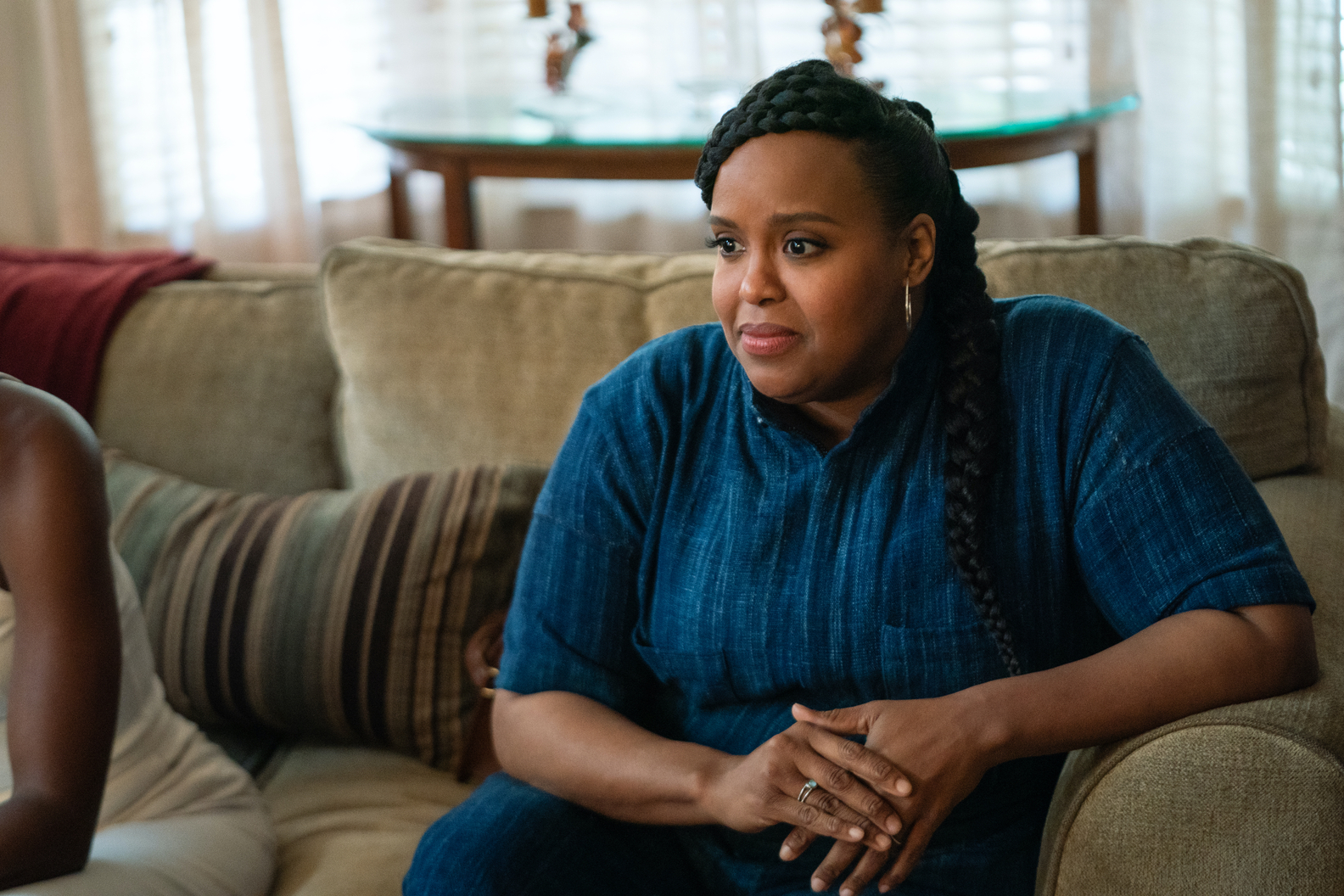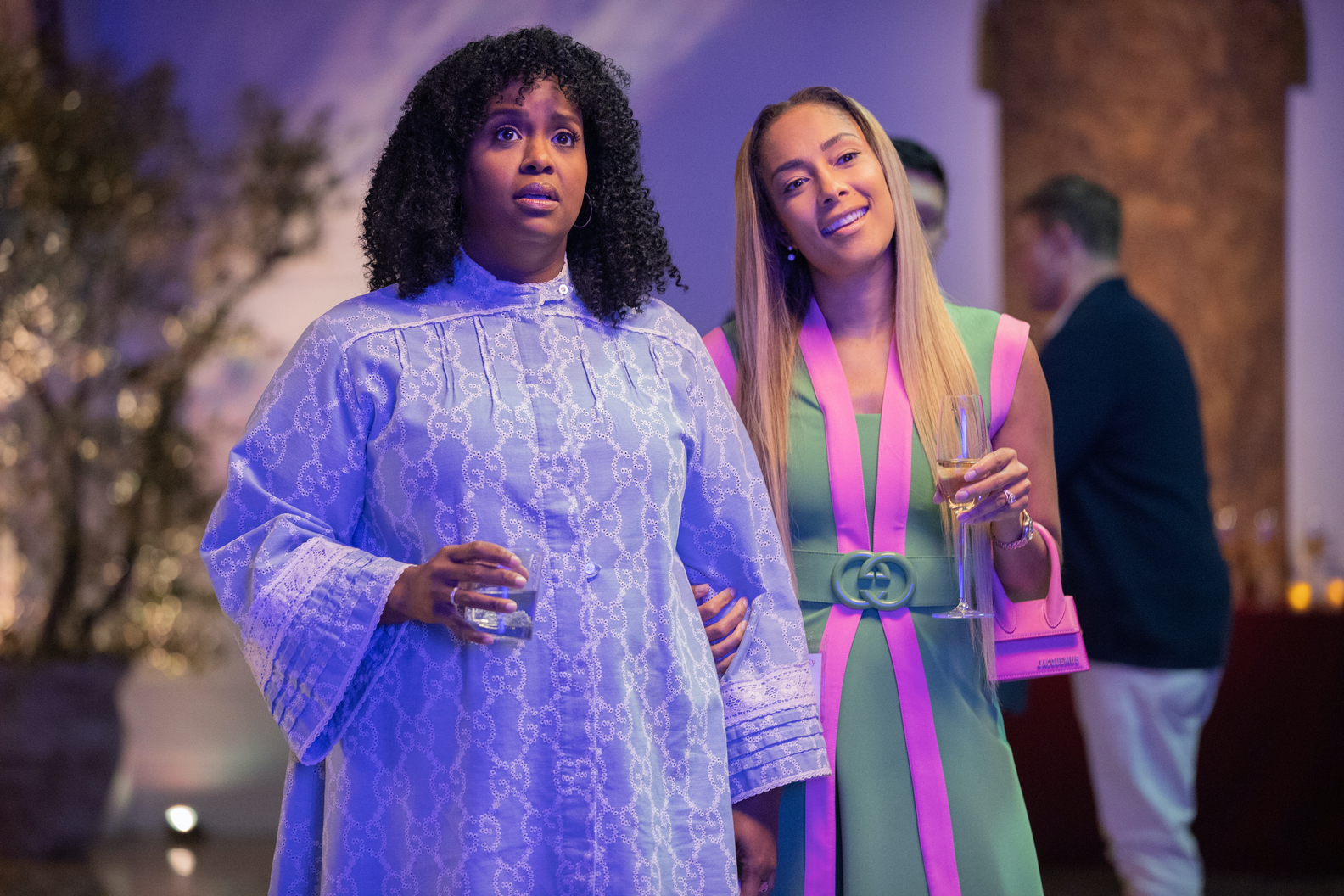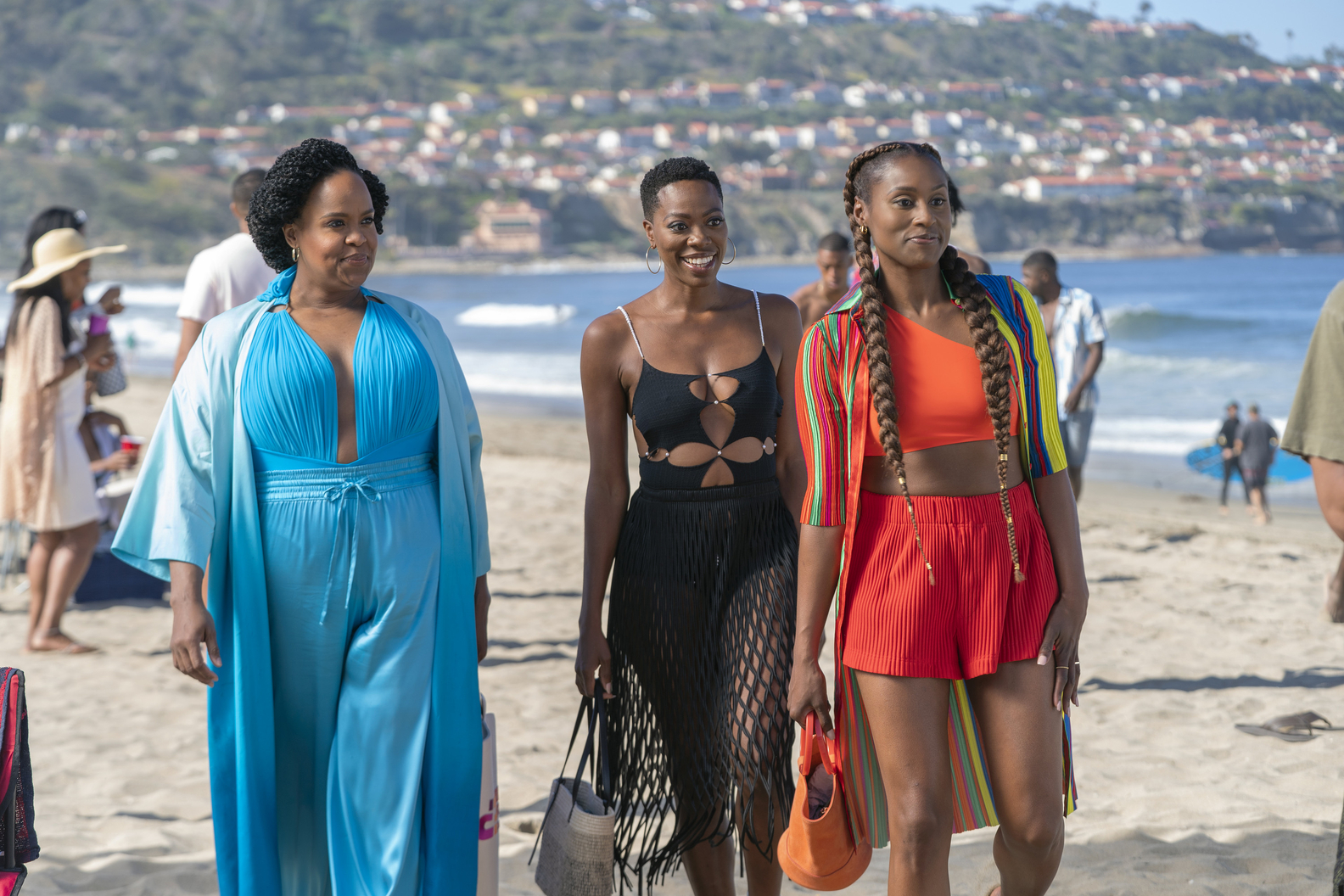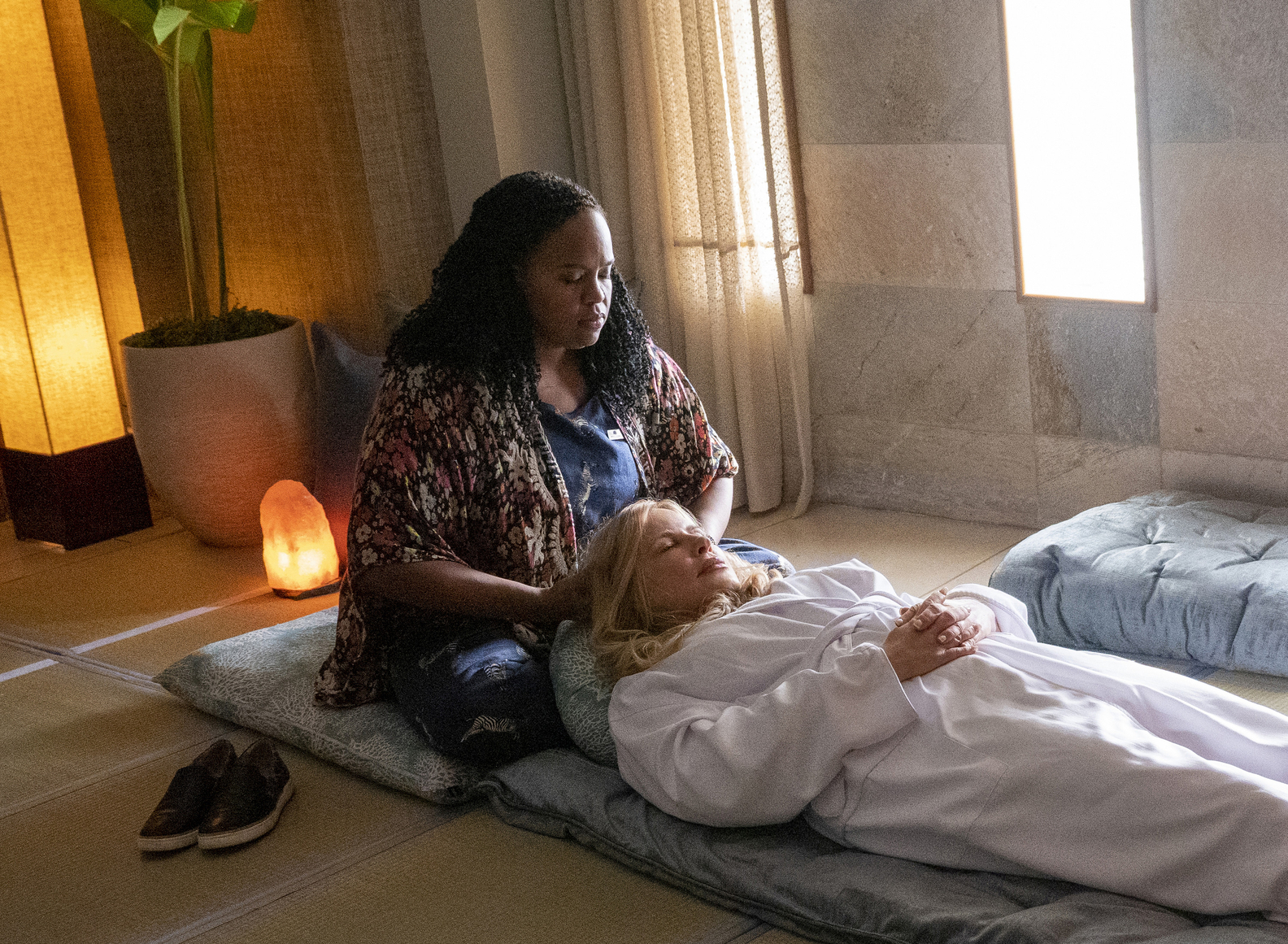
For Insecure fans, few characters have brought as much joy or as many side-splitting laughs as Kelli Prenny, Issa’s hilarious, loyal and irrepressibly confident friend. For Natasha Rothwell, bringing Kelli to life in all her comedic glory has been a full-circle experience.
Rothwell, a classically trained actor with past gigs with Upright Citizens Brigade and Saturday Night Live, was tapped by series creator and star Issa Rae to join the Insecure writing room, where she helped create the character of Kelli before being asked to portray her on the show. Over Insecure‘s five seasons, Rothwell has assumed a range of roles, onscreen and off: she plays Kelli, has written and produced multiple episodes and made her directorial debut with an episode in the final season.
Outside of Insecure, Rothwell is juggling several projects. In 2021, she became a fan favorite on Mike White’s hit HBO series, The White Lotus for her portrayal of Belinda, a compassionate and overworked spa manager at a resort in Hawaii. She also signed a multi-year deal with ABC to develop television projects with her banner, Big Hattie Productions and is co-writing and producing the coming-of-age feature, We Were There, Too for HBO Max. We’ll be seeing more of Rothwell on the big screen, too—in the Sonic the Hedgehog sequel and the upcoming Charlie and the Chocolate Factory prequel, the musical film, Wonka, which she’s currently filming in London.
Ahead of the Insecure series finale on Dec. 26, Rothwell spoke with TIME about directing for TV, what she’ll miss most about Insecure and what we can expect from her next.
TIME: You recently made your directorial debut with an episode of Insecure. What was it like to take on this new role on the show?
It’s something that I’ve been wanting to do for a long time. I over-prepare a lot, so I wanted to make sure that I did enough preparation, not just for the episode, but just making sure that I understood the point-of-view from behind the camera, as opposed to in front of it. I’m so grateful in Issa’s vote of confidence in me and I think preparation met opportunity. It was really exciting to be in relation to my cast mates in that way—to feel that they understood my directorial eye and really earned their respect. It’s hard to put into words how great of an experience that was and and I feel really lucky that my first time riding the horse, I didn’t get bucked off.
You wear a lot of hats on Insecure. Obviously, you’re one of the most beloved characters on screen as Kelli, but you’re also a writer and a producer on the show. What’s it like to have such a range of work on one show?
It’s really a dream come true. The idea of the multi-hyphenate creator was something that came after I had started working in this industry, so it was eye-opening and exciting that all of these avenues were available to me to express myself. It means a lot to be able to do that in ways that have diversity, both in front of and behind the camera. I think that it’s made me a better creator to be able to experience storytelling in such a myriad of different ways.

You’ve been on Insecure for the entirety of its five seasons. How do you think that Kelli has evolved during this time?
Kelli has been consistent in a lot of ways and that’s one of the things I love about her. The growth we’re seeing from her this season is something that’s been building over the course of the last four seasons. It’s really introspective, juxtaposed to the other characters on the show, who have marked their growth in a sort of external way. She’s being super reflective about her experience, what her friends mean to her and what she wants her legacy to be. She’s experiencing what it means to not be needed as much by her friends, as they get their “sh-t together,” so she’s able to realize that she has the bandwidth to do some more soul searching and it’s really true to life. When your circle of friends level out with the drama and the fires to put out, if you’re the helper in the group, it can be a jarring and eye-opening thing to ask, “What are my needs? What do I need?”
And do you feel that you’ve grown or evolved as well during this time?
In no uncertain terms, I have been changed as a person and as a creator and as a writer and as a producer. I feel like it’s impossible to be so enmeshed in this show in the way that I’ve been and not be changed for the better by it.
Issa is such an incredible, fearless leader, and I really did learn from her in every aspect her approach to creating her empire—the show and how deliberate she is with picking who is in that world and how they’re aligned with her vision. Finding your voice as a creator is standing up for your creative choices and what you believe in think and recognizing that homogeneity is the death of creativity and to not force your idea or script to make it sound or be like anything else. When you’re part of the production that really sees you and and believes in you, it’s hard to return to your normal life and be surrounded by people or things or projects that don’t believe in you and see you, so I’m so grateful for my experience on the show over the last five years.
Do you feel like this experience was unique to Insecure?
Being on the show is such a supportive and nurturing playground for creatives to try new things. And it’s not by any means unique in this industry, I just don’t think it’s the rule—more often than not, it’s the exception. Everyone in this industry who’s been fortunate enough to be in a room or a part of a project that allows them such creative freedom and the fullness of being seen, is always searching to find it and create it again. I’m so grateful that I’ve had this experience because when you have an experience like this, it lets you know it’s possible. You don’t have to settle for anything less than a supportive, open, safe environment that’s inclusive in front of and behind the camera. My hope is that more people can experience rooms like this and shows like this, so they can be supported and become the industry standard.

Is this the kind of environment you want to create with ABC under your new TV development deal? What can we expect from this partnership?
I’m definitely excited and encouraged by all the projects that I’ve been bringing to them and hope to bring to you all very soon. It’s taking the creation of these specific writers rooms and bringing on people to the project to produce and direct, but doing it with intention and being very deliberate about it. The environments that I’ve been so fortunate to be a part of, they don’t just happen—it takes a lot of thought and consideration and understanding of what you’re trying to achieve. Making sure those people that you bring on board are aligned with your vision and your ethos and see the world in the same way that you do. I couldn’t be more thrilled to be in a position to create those environments and opportunities for people because when it comes to inclusive, authentic environments, you have to really be selective. [They understand] what I’m trying to do is not just creative achievements, but really trying to make a change in the industry with casting and hiring.
When it comes to creating inclusive environments, what do you think are the tangible ways that we could see more of that change in the industry?
I think that question is best answered by someone who doesn’t look like me. I’m hoping that studios, executives and voices that tend to be the gatekeepers have an answer about what they plan to do, so the slates that they approve and the green lights that they give reflect the black squares they put up last summer. There are creators of color out there, from disenfranchised groups, people with disabilities, the LGBTQIA community—we know what we’re doing, the real question is, what is being done by folks that don’t walk through the world with the lenses that we have? And what do they plan to do to change the status quo?
We don’t want to beg for seats at tables, but to create tables for ourselves, making sure that those tables are populated with folks who don’t always get the opportunity to have a seat. So that’s what I’m doing, what I’ve been doing and what I plan to continue to do.
This summer, you played Belinda, a definite fan favorite, on The White Lotus, who’s a very compassionate, but much more serious character than Kelli. What was it like to take on such a drastically different role?
It’s funny to me because I’ve played versions of Kelli before and more dramatic roles before. I did quite a bit of dramatic theater before crossing over into comedy. But gravity and levity necessitate each other, so I think I bring groundedness to Kelli in the same way that I wanted to bring levity to Belinda, and those make real human performances. It was just such a great opportunity to revisit my dramatic roots and to put on a character like Belinda and play her with empathy, sense of humor, loneliness and hopefulness. Kelli is an acting choice, not just an extension of my personality. It was a deliberate choice to craft her in that way in the same way I did with Belinda. Unfortunately, this industry loves boxes and loves putting people in them, but I think that being able to portray Belinda really broke open that box.

I really felt like Belinda was the emotional core of the show.
When you are telling that kind of story, there’s so much that she doesn’t have the literal permission to say, so she just has to feel it intensely. I really wanted to show how people of color in servile positions to a largely homogenous group of people, when that’s your employment, you’re not allowed to say what you think always. It’s a really painful existence a lot of the time and I’ve been there. Showing that was really important to me. Mike [White] is just such an incredible director and gave me the space and room to wrestle with those internal pains show that part of the story that he’s telling about visibility, what you see and what’s really happening.
On this season, Kelli launches her podcast, Prenny’s Preguntas and I was wondering if there are any good podcasts that you’re listening to now.
Oh, my goodness—Brené Brown’s Unlocking Us. I love that and I love her so much. I also love that she loves Ted Lasso; she’s just down to earth. My regulars are The Daily, I listen to it every day. And The Read is incredible, with Kid Fury and Crissle. The Heart also just came out, but I haven’t gotten to it yet. I don’t know if Kelli would listen to those.
I get big Super Soul Sunday vibes from Kelli on Prenny’s Preguntas.
Yeah, I think she’s Oprah with a few…margaritas? I think that’s what it is. I think it’s Super Soul Sunday, for sure, with a little bit of a Super Soul sangria.
Looking back on your time on the show, do you have a favorite moment on-screen or off-screen?
Oh boy. There’s just so many moments. Millicent [Shelton] was just an incredible director, and she did our Coachella episode and all of the four girls in that episode went through a lot. Kelli was all over the place, getting tased, peeing herself! It was one of the episodes we bonded together as actors. I just had so much fun.
Off-screen, the episode I wrote last season, “Low-key Happy”—it was a career highlight to be able to write something and shepherd it through production. I remember Issa came up to me on our last day shooting, we wrapped and clapped and hugged. And she sort of pulled me aside and said, “You’re ready.” And she and I both knew that she was talking about my directing. It was one of those things that wasn’t for public consumption and it’s something that I didn’t know I needed to hear, but it was a really special moment between us. It was a really affirming moment and I’ll always be grateful to her for that.
More Must-Reads from TIME
- Donald Trump Is TIME's 2024 Person of the Year
- Why We Chose Trump as Person of the Year
- Is Intermittent Fasting Good or Bad for You?
- The 100 Must-Read Books of 2024
- The 20 Best Christmas TV Episodes
- Column: If Optimism Feels Ridiculous Now, Try Hope
- The Future of Climate Action Is Trade Policy
- Merle Bombardieri Is Helping People Make the Baby Decision
Write to Cady Lang at cady.lang@timemagazine.com